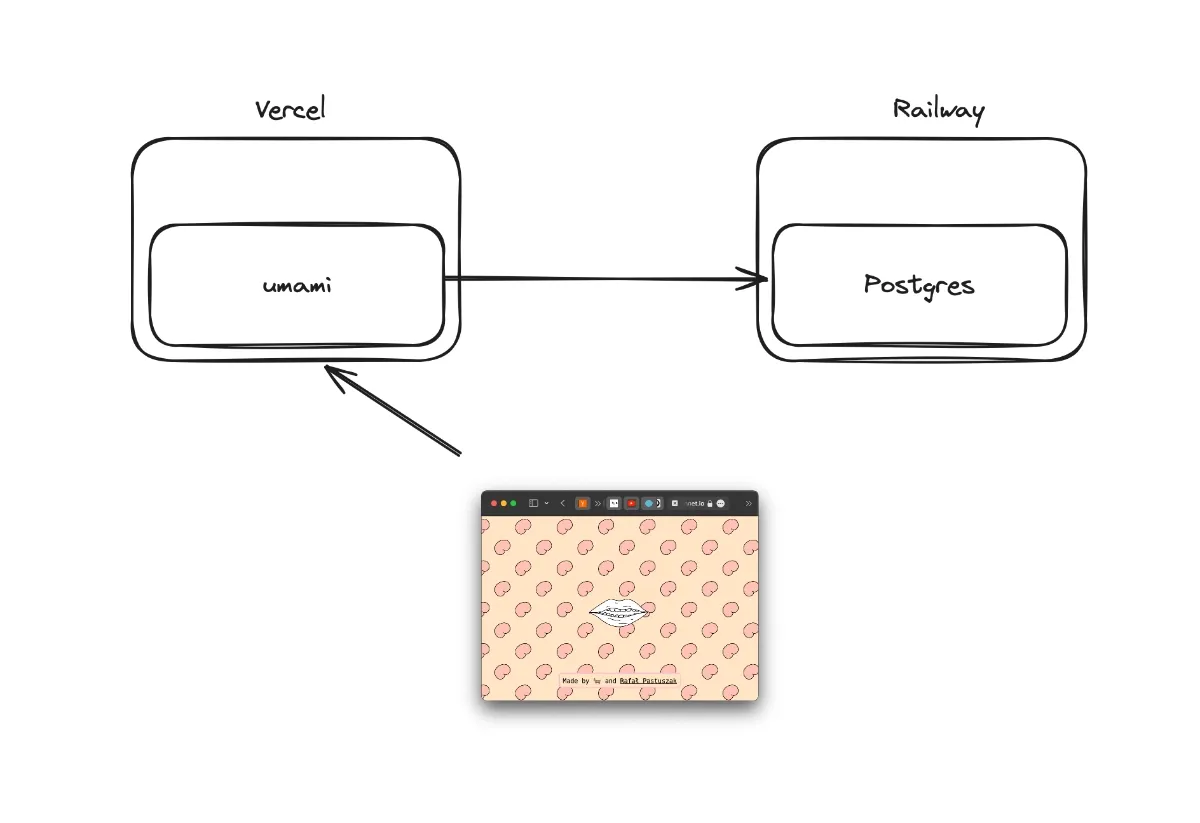
We'll start with how and move on to why. I think why is more interesting than how.
(last update: 2024-09-26)
Scope
Most of the 50 or so little projects I built don't rely on analytics. I have a self-hosted umami.is instance running on Vercel with a Postgres db running on Railway. It handles 25 sites, with projects such as:
- my blog
- this website
- my important meeting notes
- things I sell, like midnight
- some apps/experiments (e.g. Sit.)
- some smaller, weirder experiments like the Uncolouring Book, Meat GPT
- a variety of succulent Mrrs
My railway usage is low enough not to exceed the monthly free usage tier ($5, I wouldn't mind paying.) Setting up a self-hosted umami instance is pretty simple. Learn more here.

Ensō (the web app) only fires a single hello event so I can get a rough number of page impressions for a given day.
export const trackVisits = () =>
fetch('/api/hello', { credentials: 'omit'}).catch()
// api/hello.ts
const db = await getDB()
db.collection('visits').insertOne({
at: new Date(),
host: req.headers.host ?? 'unknown',
ua: req.headers['user-agent'] ?? 'unknown',
}).catch(error => console.error(error))
res.status(200).send('oh hi mark')
The code tries to strip any unnecessary information and, looking at this now, I can see that I can make it even dumber.
I believe we should keep more of this stuff public because:
- Analytics are for you as much as they're for me (Kind software).
- I approach any form of data collection with distrust and I think you should too.
Long time ago, I used to have run a public DIY analytics service so my users could see exactly what and how I collected, but it was too much hassle to maintain and people didn't seem to care that much. I even called it palantir to keep things angsty and edgy. But nothing, nada.
Why and what to collect
I use analytics to solve user problems. Every metric should reflect that. Anything more than that is a burden: to the user, to my problem solving ability (focus) and to my own mental health. So, I try to collect as little as possible.
Metrics I care about
- # of visits
- # of sessions (without persistence, I don't care about cookies or unique users)
- frequently visited pages
- browser
- referer
- country
I'm trying to be strict with collecting only the metrics that can answer relevant questions. I also don't collect any "open" user input data in my tracking events (e.g. Meat GPT chat "queries"). The Tip of the Tongue is an exception here as I allow users to opt-in to sharing their queries.

Custom events
I collect custom events (CTA:hero:click, sit:session:interrupted). This is to:
- detect UX pitfalls, e.g. why did the ratio of
sit:session:preptosit:session:startdrop so suddenly? - detect bugs and regressions, e.g. audio playback errors if Apple decides to make things spicy by breaking a PWA or Audio feature (monitoring for cheap bastards™)
- measure feature usage, especially for experiments, but also to remove the stuff I don't need (Kill your darlings, their bones are the best fertiliser)
Admin UX
I'm happy for things to be a bit clunky if I can just get stuff done and answer the right questions. A bit of friction is good for me as it makes it harder to obsess about unnecessary details, yak-shave or check the stats too often.
Wishlist
It would be useful to have an overview of all tracked sites, esp. to quickly spot any unexpected spikes, perhaps track a blog that mentions my work.
For now, I'm happy with it as it is. It's good enough, because it has just the right amount of friction to let me focus on work.
In future, instead of moving to a different approach I'll design something that would work for my specific needs and tests it with a bunch of people to see if I can make it sustainable.
 Did you enjoy reading this article? Consider
Did you enjoy reading this article? Consider 
